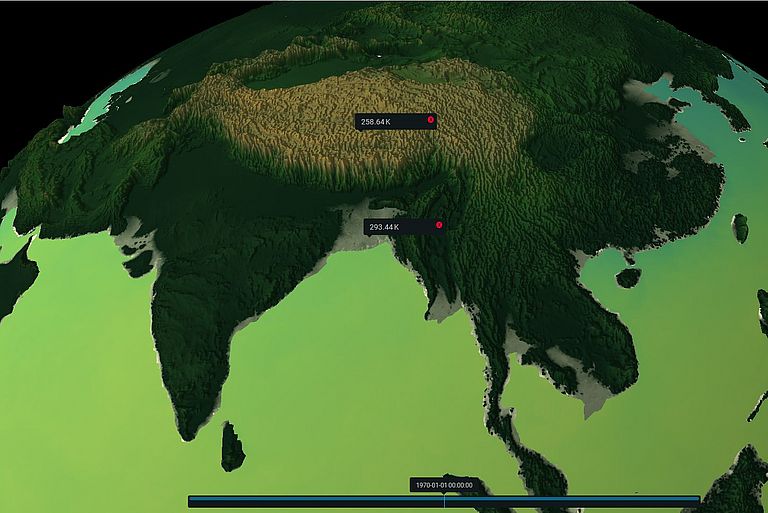Special Award for ‘Digital Earth’ at the ‘Digital Leader Awards’
Helmholtz project receives award for innovative geo and environmental research
Last night was indeed thrilling for the Helmholtz ‘Digital Earth’ team. It was one of the nominees for the renowned ‘Digital Leader Awards’, presented to pioneers of the digital transformation. Shortly before the end of the award ceremony, the moderation team declared ‘Digital Earth’ the winner of a special award for ‘Digital Science’ in the category ‘Society’. ‘This is incredibly great. We are the first project from the field of publicly funded research that received an award and they were so fascinated about what we are doing that they created a special award,’ says Prof. Dr. Jens Greinert from the GEOMAR Helmholtz Centre for Ocean Research in Kiel. Professor Greinert is the coordinator of ‘Digital Earth’, which consists of eight Helmholtz centres working in cooperation together. The centres consist of GEOMAR, the Alfred Wegener Institute Helmholtz Centre for Polar and Marine Research (AWI), the Helmholtz Centre Potsdam - German Research Centre for Geosciences (GFZ), Forschungszentrum Jülich (FZJ), the Helmholtz Centre München (HMGU), the Helmholtz Zentrum Geesthacht Centre for Materials and Coastal Research (HZG), the Karlsruhe Institute of Technology (KIT) and the Helmholtz Centre for Environmental Research (UFZ).
‘Digital Earth’, which launched in May 2018, is part of a broad strategy of the Helmholtz Association in the ‘Earth and Environment’ research field. It aims to integrate the eight centres more closely in terms of infrastructure, data technology and data-driven science. Scientists collect atmospheric, marine and terrestrial data using sensors in the field and satellites in space, which is analysed in laboratories and modelled on high performance computers. However, integrating the large and particularly heterogeneous data from many different sources is difficult and needs a new approach to scientific working. ‘We are developing new methods to merge data from atmospheric, marine and terrestrial research and analyse them jointly in an efficient way across Earth compartments and natural science disciplines,’ says Professor Greinert, describing the project's goals.
The researchers in ‘Digital Earth’ are not only using new data science methods, such as machine learning and analysis workflows, but they are also improving them. ‘Close and integrated cooperation between natural and data scientists is necessary to better understand the complex processes in the Earth system and to be able to provide answers to the challenges of climate change, resource security and increasing environmental hazards,’ emphasises Professor Greinert.
The jury of the ‘Digital Leader Award’ also highlighted the great importance of digital sciences for the continued development of the Earth Sciences, even if one cannot yet measure results in terms of numbers or profits, as is the case with other award winners.
‘So many young scientists work in Digital Earth. The award is a great confirmation and motivation especially for them,’ emphasises project manager Dr. Daniela Henkel from GEOMAR, ‘it shows that our efforts are also noticed and appreciated outside the scientific community’.
Background information: The GEOMAR in Digital Earth:
The GEOMAR Helmholtz Centre for Ocean Research Kiel is the overall coordinator of the ‘Digital Earth’ project. In addition, data scientists are working on data visualisation tools such as the 4D Data Viewer, on the balancing of greenhouse gases in the ocean with the aim of improving data-driven sampling / installation of monitoring stations or the detection of ammunition bodies in bathymetric / magnetic data sets using Deep Neural Networks.

![[Translate to English:] Sieger-Signet DLA2020 [Translate to English:] Sieger-Signet DLA2020](/fileadmin/_processed_/f/f/csm_DLA2020_Sieger_DIGITAL_SCIENCE_67ca9f20d9.jpg)


